If you’re looking to make your building more durable, aesthetically pleasing, or energy-efficient, you’ve likely come across metal corrugated wall panels. These materials are loved by architects, contractors, and homeowners for their versatility, strength, and modern look. In this in-depth guide, we will explore metal corrugated wall panels, their types, uses, installation processes, and how to choose the right supplier. We’ll also dive into the technical specifications to arm you with everything you need to make an informed decision.
Overview
Corrugated metal wall panels are sheets of metal that are bent or rolled into a repetitive wave-like pattern, also known as corrugations. These waves or ridges provide added strength, durability, and aesthetic appeal. Metal panels are widely used in the construction industry for both exterior and interior applications, from cladding and roofing to interior decoration.
The primary reasons why metal corrugated panels are so popular include their:
- Durability: They resist rust, corrosion, and extreme weather conditions.
- Energy efficiency: Metal reflects heat, keeping interiors cool.
- Cost-efficiency: Compared to other wall materials, metal is both cost-effective and long-lasting.
- Aesthetic appeal: These panels offer a sleek, modern look with various designs, colors, and finishes.
Corrugated Metal Wall Panels
The corrugated design was originally invented to make materials stronger without adding weight. Today, metal corrugated wall panels come in a variety of shapes, sizes, and metal types to suit different needs. Below is a complete guide to the most common types.
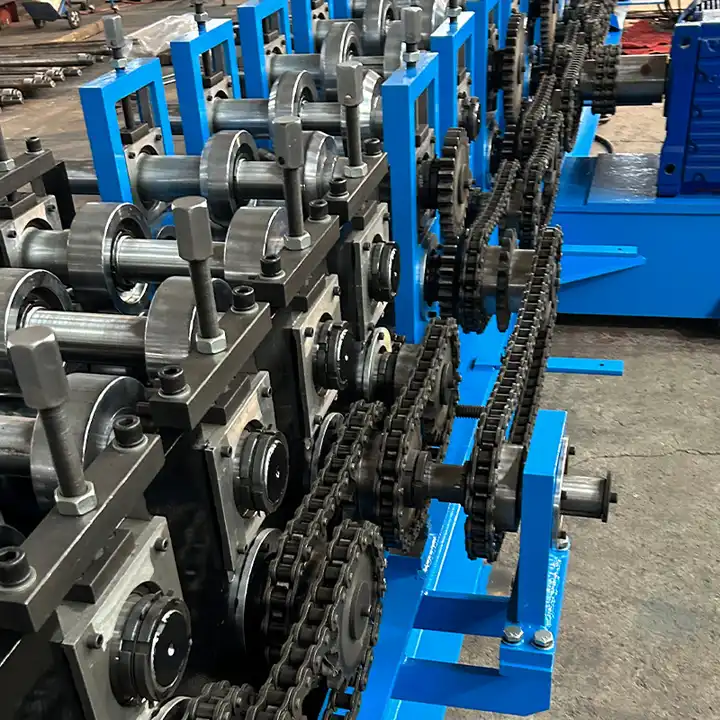
Types of Metal Corrugated Wall Panels
| Panel Type | 描述 | Best For |
|---|---|---|
| गैल्वेनाइज्ड स्टील | Made from steel with a protective zinc coating that prevents rust and corrosion. Often used in harsh environments. | Industrial, commercial buildings |
| Aluminum Panels | Lightweight, corrosion-resistant, and perfect for areas with heavy rainfall or salt exposure. | Coastal, residential applications |
| Stainless Steel | More expensive, but offers premium rust resistance and a polished finish. | High-end projects, architectural |
| Copper Panels | Known for its natural patina over time, copper develops a beautiful greenish hue that offers a timeless aesthetic. | High-end residential, unique designs |
| Zinc Panels | Like copper, zinc is long-lasting and develops a patina that changes color, but it offers better corrosion resistance. | Eco-friendly projects, green designs |
| Corten Steel | A weathering steel that forms a protective rust layer on the surface, offering a rustic, aged look while remaining durable. | Architectural, artistic buildings |
| Color-Coated Panels | These steel or aluminum panels are painted in a wide variety of colors, allowing for custom designs. | Residential, commercial applications |
| Perforated Metal Panels | Panels that feature patterns of holes, offering a unique texture and light-filtering effect. | Interior, decorative, acoustic uses |
| Insulated Metal Panels | These are multi-layer panels with built-in insulation, offering superior energy efficiency and soundproofing. | Cold climates, energy-efficient homes |
| Tin Corrugated Panels | Traditional metal option often used for its nostalgic and rustic look in specific builds like barns and sheds. | Barns, sheds, rural structures |
How Metal Corrugated Wall Panels Work
So, how exactly do these corrugated panels offer such strength and durability? The secret lies in the corrugation process itself. When flat metal is bent into waves or ridges, its load-bearing capacity increases significantly. The corrugated structure distributes stress more evenly across the surface, making it less susceptible to damage.
Working Process of Metal Corrugated Wall Panels
- सामग्री चयन: The process starts by choosing the right type of metal (e.g., galvanized steel, aluminum, or copper) based on the desired characteristics such as corrosion resistance or aesthetic appeal.
- Corrugation: The metal is passed through a roll-forming machine, where it’s pressed into the desired wavy pattern. This not only strengthens the metal but also gives it its unique look.
- Coating and Finishing: After forming, some panels are coated with protective layers, such as paint, zinc, or anodization, to enhance their lifespan and resistance to environmental factors like rust and UV radiation.
- Cutting to Size: Once the metal is corrugated, it’s cut into panels of the appropriate length for the specific project requirements.
- Installation: The panels are typically attached to a building structure using fasteners, screws, or clips, ensuring a snug, weather-tight fit.
Key Components and Their Functions
| Component | Function |
|---|---|
| Base Metal (Steel, Aluminum, etc.) | The structural foundation of the panel that determines its strength, weight, and corrosion resistance. |
| Corrugations | Provide structural rigidity, increase strength, and improve load distribution. |
| Coating (Zinc, Paint, etc.) | Protects the metal from rust, UV rays, and other environmental damage. |
| Fasteners | Bolts, screws, or clips that secure the panels to the building structure, ensuring a tight seal. |
| Insulation (for insulated panels) | Reduces heat transfer and improves energy efficiency in both cold and hot environments. |
Machine Speed and Efficiency of Manufacturing Metal Corrugated Panels
When producing metal corrugated panels, the efficiency of the manufacturing process depends heavily on the machinery used. Here’s a breakdown of the typical machine parameters used in metal panel production.
| Parameter | Typical Speed | Efisiensi |
|---|---|---|
| Roll Forming Speed | 10-20 meters per minute | High |
| 切割速度 | 5-10 cuts per minute | Medium |
| Coating Application | 15-25 square meters per minute | High |
| Corrugation Speed | 15-30 meters per minute | High |
| Stacking Efficiency | 50 panels per hour | Medium |
Customized Mechanical Parameters
One of the most attractive features of metal corrugated wall panels is their versatility. Depending on the project, you can customize various mechanical parameters. Here’s a look at some of the most common customization options.
| Parameter | Customizable Range |
|---|---|
| Panel Thickness | 0.5 mm – 2.0 mm |
| Panel Length | 1 meter – 12 meters |
| Corrugation Height | 6 mm – 50 mm |
| Material Grade | Galvanized steel (G90, G60), Aluminum (6061, 3003) |
| Coating Thickness | 20 microns – 50 microns |
| Color Options | Over 50 colors available |
-
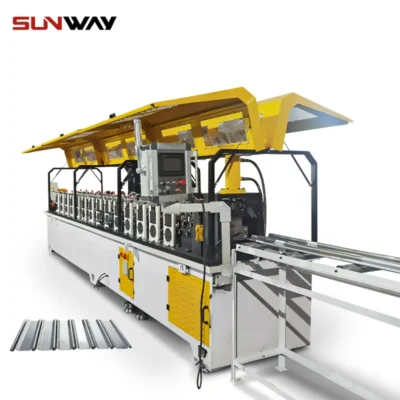 रोलिंग शटर स्लेट रोल बनाने की मशीन
रोलिंग शटर स्लेट रोल बनाने की मशीन -
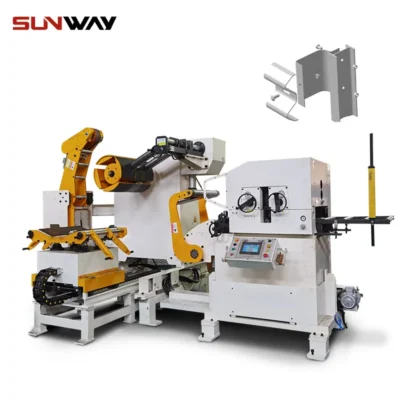 Highway Guardrail End Terminal Forming Machine
Highway Guardrail End Terminal Forming Machine -
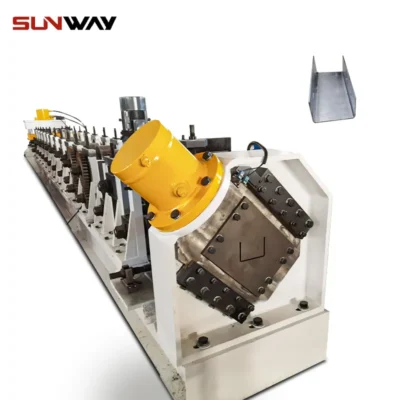 Highway U/C Post Roll Forming Machine
Highway U/C Post Roll Forming Machine -
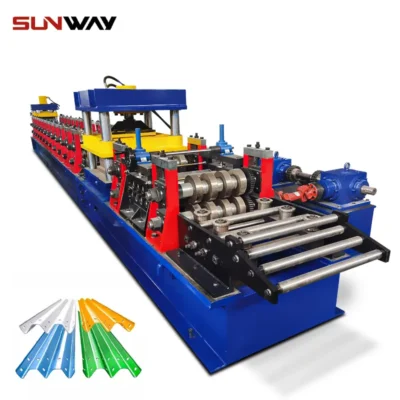 2 वेव्स हाईवे गार्डरेल रोल फॉर्मिंग मशीन
2 वेव्स हाईवे गार्डरेल रोल फॉर्मिंग मशीन -
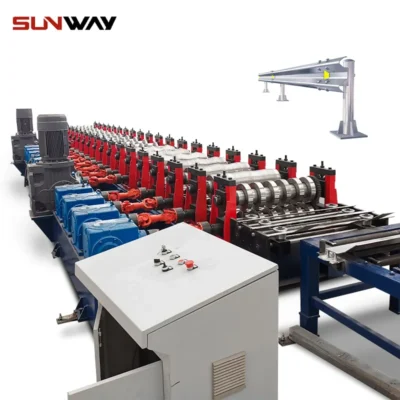 三波型高速公路护栏辊压成型机
三波型高速公路护栏辊压成型机 -
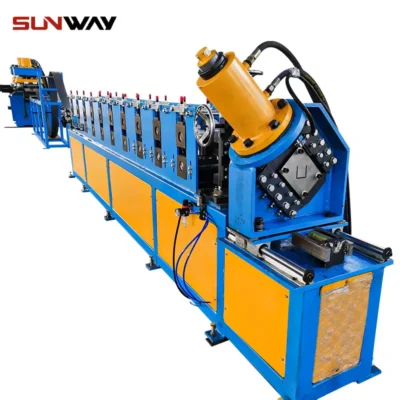 विद्युत कैबिनेट फ्रेम रोल बनाने की मशीन
विद्युत कैबिनेट फ्रेम रोल बनाने की मशीन -
 दीन रेल रोल बनाने की मशीन
दीन रेल रोल बनाने की मशीन -
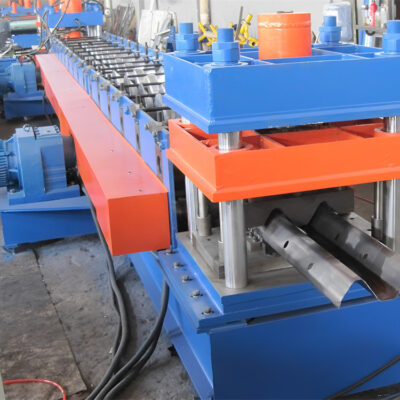 दो लहरें राजमार्ग रेलिंग मशीन
दो लहरें राजमार्ग रेलिंग मशीन -
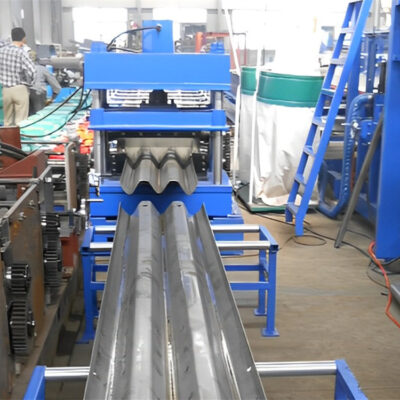 तीन लहरें राजमार्ग रेलिंग मशीन
तीन लहरें राजमार्ग रेलिंग मशीन
Applications and Uses of Metal Corrugated Wall Panels
Metal corrugated wall panels are used across a variety of industries for their durability, aesthetics, and versatility. Below is a table summarizing the typical applications.
| Industry | आवेदन |
|---|---|
| Residential | Exterior cladding, accent walls, roofing |
| Commercial | Storefronts, office buildings, interior design features |
| Agricultural | Barns, silos, sheds |
| Industrial | Factories, warehouses, storage facilities |
| Architectural | Artistic installations, high-end residential, and commercial projects |
| Environmental | Solar panel mounts, eco-friendly structures |
| Interior Design | Feature walls, ceilings, furniture decoration |
Installation, Operation, and Maintenance of Metal Corrugated Wall Panels
Installing metal corrugated wall panels is straightforward but requires attention to detail to ensure optimal performance and durability. Below is a table that summarizes the key steps and requirements for installation, operation, and maintenance.
| Process | विवरण |
|---|---|
| Installation | Panels are installed using fasteners, starting at the base and working upwards. Overlapping is essential to prevent leaks. |
| Operation | Once installed, they require minimal operation except in cases of insulated panels, which may require checking the insulation over time. |
| Maintenance | Inspect periodically for dents, scratches, and corrosion, especially at fastener points. Clean with mild soap and water. |
| Lifespan | 40-70 years depending on material and environmental conditions. |
Suppliers and Price Range of Metal Corrugated Wall Panels
The cost of metal corrugated panels can vary widely depending on the material, size, and customization. Below is a table showcasing suppliers and the typical price range.
| Supplier | Price Range (per square foot) | सामग्री | Delivery |
|---|---|---|---|
| ABC Metal Roofing | $2.50 – $5.00 | Galvanized Steel, Aluminum | Nationwide |
| McElroy Metal | $3.00 – $6.50 | Aluminum, Stainless Steel | Nationwide |
| Metal Sales | $2.75 – $5.75 | Steel, Copper | Local |
| Bridger Steel | $3.50 – $7.00 | Corten, Zinc, Color-Coated | Nationwide |
| Western States Metal | $4.00 – $8.00 | Corten, Copper, Aluminum | Nationwide |
How to Choose the Right Supplier for Metal Corrugated Wall Panels
Choosing the right supplier can make or break your project. Here’s what to look for:
| 因素 | Consideration |
|---|---|
| Material Quality | Look for high-quality materials such as G90 galvanized steel or 6061 aluminum. Ask for certifications and warranties. |
| 定制选项 | Ensure the supplier can provide custom sizing, thickness, and color options. |
| Lead Time | Check how quickly the supplier can deliver your order, especially for large projects. |
| Price Transparency | Compare pricing from multiple suppliers and ask for detailed breakdowns. Look for hidden fees such as shipping or cutting costs. |
| Reputation and Reviews | Always check reviews and testimonials to gauge customer satisfaction and product performance. |
| Support and Service | Consider suppliers who offer technical support and guidance for installation and maintenance. |
Comparing Pros and Cons
When deciding whether to use metal corrugated wall panels, it’s essential to weigh the advantages and disadvantages.
| Aspect | Pros | Cons |
|---|---|---|
| Durability | Extremely durable, resistant to rust, corrosion, and extreme weather conditions. | Can be prone to denting if not properly maintained. |
| 能效高 | Reflects sunlight, helping to reduce cooling costs. | Metal can get hot in direct sunlight if uninsulated. |
| Aesthetic Appeal | Offers a sleek, modern look with customizable colors and finishes. | Some people may find the industrial look too stark. |
| 成本 | Relatively affordable compared to other cladding materials like wood or stone. | Custom panels can get expensive, especially premium materials like copper or corten. |
| Installation | Quick and easy to install, particularly for experienced contractors. | DIY installation can be tricky without proper tools and expertise. |
| Maintenance | Low maintenance, requires periodic cleaning and fastener checks. | Prone to scratches and dents over time, requiring occasional touch-ups. |
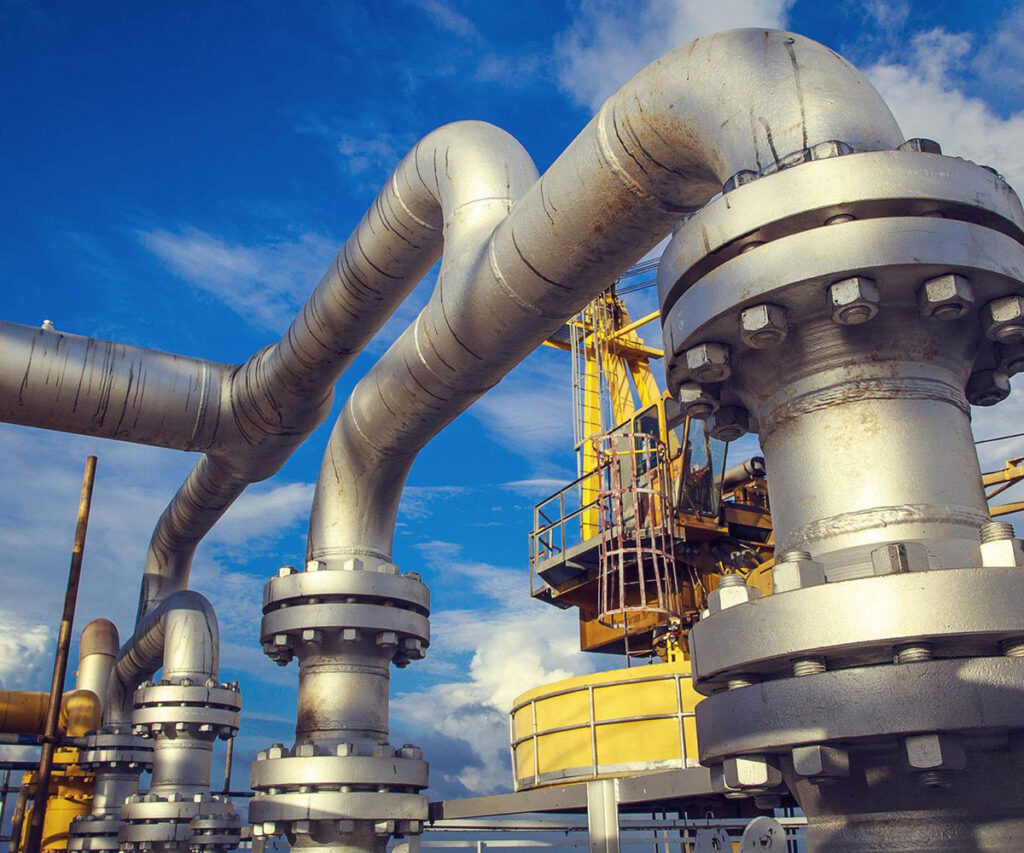
सामान्य प्रश्न
| Question | Answer |
|---|---|
| What is the lifespan of metal corrugated wall panels? | Depending on the material, metal panels can last between 40-70 years with proper maintenance. |
| Are metal panels energy efficient? | Yes, metal reflects sunlight and can significantly reduce cooling costs, particularly when insulated. |
| Do metal corrugated panels rust? | Certain materials like galvanized steel and aluminum resist rust, while corten steel develops a protective rust layer. |
| Can I paint metal corrugated panels? | Yes, many panels come pre-coated with paint or can be painted post-installation. |
| How do I maintain metal panels? | Clean periodically with mild soap and water. Check fasteners for rust or damage and replace if necessary. |
| Can I install metal panels myself? | DIY installation is possible but requires proper tools and expertise. It’s recommended to hire a professional for large projects. |
निष्कर्ष
Metal corrugated wall panels offer a perfect blend of strength, style, and cost-efficiency for both residential and commercial projects. By understanding the various types, installation processes, and key features, you can confidently choose the best panel for your needs. Whether you’re aiming for a modern industrial aesthetic or looking for an energy-efficient building solution, metal panels are a versatile and reliable choice.
Now that you’re equipped with all this knowledge, are you ready to start your next project? If so, the only thing left is choosing your supplier and placing your order!
